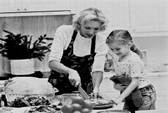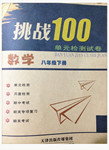题目内容

As a young girl growing up in rural Alabama, I never understood why my mom spent so much time baking. And she always made my brother and me1her. A whole day every other week was devoted to making bread. It always made our small arms tired.
Despite our best efforts, the flour dust always went everywhere. I2to be outside with my playmates, and never3my mom’s desire for quality family time with her children, at least when it came to spending it in the4. Years have gone by, and I have become a mother myself. I prefer to leave most of the cooking to my husband and he loves it. He’s quite5at doing it, too.
On one occasion my husband was6dinner, and I was at the kitchen table going through the day’s mail when our little son, Cody, asked if he could help7. My husband said yes, and I sat there amused, watching them.
“What are you doing?” I asked.
“Helping dad cook.” he replied with a big8on his face. I thought back to those9when my mom asked me to help her bake bread, and I was10, but obeyed. Perhaps she was trying to create something more than just fresh bread—maybe a few lasting11.
As I watched Cody do it with all his attention, I realized that he had12
- 1.
- A.copy
- B.help
- C.notice
- D.admire
- A.
- 2.
- A.improved
- B.encouraged
- C.longed
- D.blamed
- A.
- 3.
- A.wondered
- B.appreciat
- C.judged
- D.challenged
- A.
- 4.
- A.kitchen
- B.restaurant
- C.bedroom
- D.school
- A.
- 5.
- A.unhappy
- B.weak
- C.astonished
- D.skilled
- A.
- 6.
- A.preparing
- B.choosing
- C.making
- D.having
- A.
- 7.
- A.play
- B.work
- C.cook
- D.make
- A.
- 8.
- A.get uptear
- B.surprise
- C.smile
- D.mark
- A.
- 9.
- A.dreams
- B.time
- C.mysteries
- D.accidents
- A.
- 10.
- A.excited
- B.regretful
- C.confident
- D.unwilling
- A.
- 11.
- A.memories
- B.choices
- C.opportunities
- D.goals
- A.
- 12.
- A.continued
- B.created
- C.failed
- D.served
- A.
试题分析:作为一个年轻的女孩在阿拉巴马乡村长大的我一直不明白为什么我妈妈花了那么多时间烘烤,直到自己做了母亲看到孩子帮丈夫在厨房做饭的场景才理解了妈妈的做饭培养了我浓浓的亲情意识。
1.B。考查动词辨析. copy抄写 help 帮助notice 注意 admire 钦佩,欣赏。妈妈在烤面包,所以得出:妈妈总是让我和哥哥帮助她。
2.C。考查动词辨析。improve改善 encourage 鼓励 longe渴望 blame责备。固定短语Long to do sth渴望做某事。爱玩是孩子的天性,又是和同伴一起因此得出:我渴望和同伴们一起出去玩。
3.B。考查动词辨析:wonder想知道appreciate感激,欣赏,领会 judge判断challeng挑战。作为孩子贪玩且年龄不够,因词不能理解妈妈,所以得出:从来不领会妈妈想在家里和孩子们在一起的愿望。
4.A考查上下文联系。kitchen厨房 restaurant餐馆bedroom卧室 school 学校据上文作者不理解妈妈想让全家人在一起,尤其是在厨房里,作为一个孩子更不理解,所以得出得出:尤其是涉及一家人在厨房里吃饭。
5.D。考查上下文联系。unhappy不高兴weak虚弱astonished感到惊讶.skilled熟练的。据前句:我把做饭的留给丈夫做,他喜欢做,所以得出:也擅长做。
6.A。考查动词辨析。prepare准备。choose选择 ,make 制作,have有。有一次丈夫在厨房里,当然是:正在在准备饭。
7.C。考查上下文联系。据上文丈夫正在做饭,和下文“Helping dad cook.所以儿子问他能否帮助他做饭。
8.C考查上下文联系。smile 笑父亲满足了孩子的愿望所以孩子面带的是笑容。
9.B。考查定语从句。time 本句是定语从句,后面的关键词即先关系词是when ,所以是时间。我想起了妈妈让我帮她烤面包的时间。
10.D。考查形容词辨析。 excited 感到兴奋的regretful 遗憾的 confident 自信的unwilling 不情愿的。据下文的关键词but obeyed 是转折关系所以是不情愿。
11.A。考查名词辨析。memories 记忆.choices选择 opportunities 机会goals目标。据上文现在还能回想起那段时光,所以妈妈的用意不只是做面包而是留下永久的记忆。
12.B。考查动词辨析。. Continue继续create 创造 fail失败 serve服务。当我看着儿子专心帮做烤面包,我意识到儿子(和当年的妈妈一样)创造了对我来说永久难忘的一刻。
考点:人生百味类记叙文。

 挑战100单元检测试卷系列答案
挑战100单元检测试卷系列答案I’ve loved my mother’s desk since I was just tall enough to see above the top of it as Mother sat doing letters(学问). Standing by her chair, looking at the ink bottle, pens, and white paper, I decided that the act of writing must be the most wonderful thing in the world.
Years later, during her final illness, Mother kept different things for my sister and brother. “But the desk”, she said again, “is for Elizabeth.” I never saw her anger, never saw her cry. I knew she loved me; she showed it in action. But as a young girl, I wanted heart-to-heart talks between mother and daughter. They never happened. And a gulf opened between us. I was too emotional. But she lived “on the surface”.
As years passed, I had my own family. I loved my mother and thanked her for our happy family. I wrote to her in careful words and asked her to let me know in any way she chose that she did forgive(原谅)me. I posted the letter and waited for her answer. None came. My hope turned to disappointment, then little interest and, finally, peace-it seemed that nothing happened. I couldn’t be sure that the letter had even got to Mother. I only knew that I had written in, and I could stop trying to make her into someone she was not.
Now the present of her desk told me, as she’d never been able to, that she was pleased that writing was my chosen work. I cleaned the desk carefully and found some papers inside-a photo of my father and a one-page letter, folded and refolded many times. Give me an answer, my letter asks, in any way you chose. Mother, you always chose the act that speaks louder than words.
【小题1】The writer began to love her mother’s desk _______.
| A.after Mother died. | B.before she became a writer. |
| C.when she was a child. | D.when Mother gave it to her. |
| A.Mother was cold on the surface but kind in her heart to her daughter. |
| B.Mother was too serious about everything her daughter had done. |
| C.Mother cared much about her daughter in words. |
| D.Mother wrote to her daughter in careful words. |
| A.deep understanding between the old and the young. |
| B.different ideas between the mother and the daughter. |
| C.free talks between mother and daughter. |
| D.part of the sea going far in land. |
| A.She had never received the letter. |
| B.For years, she often talked about the letter. |
| C.She didn’t forgive her daughter at all in all her life. |
| D.She read the letter again and again till she died. |
| A.My Letter to Mother. | B.Mother and Children. |
| C.My Mother’s Desk. | D.Talks between Mother and Me. |